As the car age, it is more likely to develop different car problems. One of the most common and also the most bothersome is vibration or shaking. If you ever start experiencing such annoyance, you’ll wonder what causes it. You may start to ask why your car is shaking or vibrating.
Well, there are different reasons as to why your car shakes or vibrates. Philkotse.com has gathered some of the most common reason to help you determine the problem with your car.
1. Bad tires
Dry, old, worn-out or bald tires are one of the root cause of excessive road vibration. The car’s tires are the only contact of the vehicle with the road. They are also known to have a relatively short lifespan. There are different ways on how tire problems contribute to the shake and vibration of a car. Some of which are the following:
- Uneven tire wear – this requires tire rotation
- Tires have separated tread – this needs tire replacement
- Tires roll unevenly and/or out of round – this also needs tire replacement
- Tires are old – these tires need to be replaced
- The tire is too low – this requires top-off
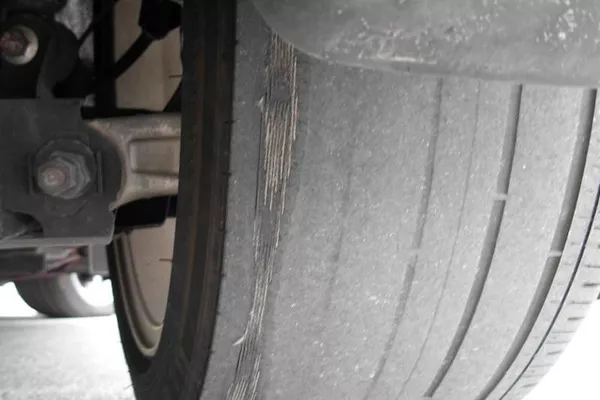
Dry, old, worn-out or bald tires are one of the root cause of excessive road vibration
2. Low rolling resistance or low-profile tires
As mentioned above, tires are one of the most common culprits of car vibrations. Low rolling resistance tires are also called low-profile tires. These tires become increasingly common together with the rise of electric vehicles and hybrid cars. These types of tires reduce the resistance and drag which boosts the EPA fuel economy rating.
The EPA fuel economy rating is a critical advantage for these cars most particularly from a marketing standpoint. But according to most drivers, these low rolling resistance tires are harder compared to what they are used to drive. It is also unpleasant to drive because they do not absorb most of the road’s imperfections.
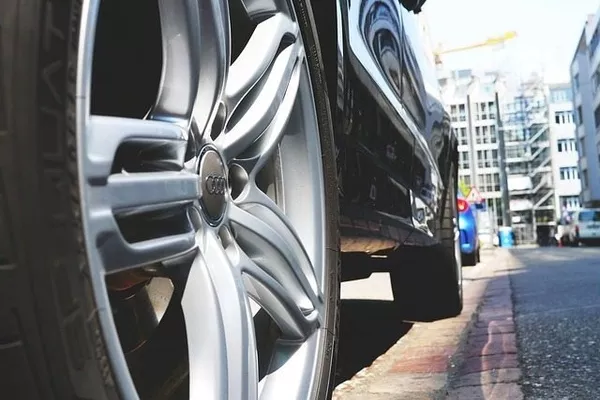
Low rolling resistance tires are also called low-profile tires
Simply put, low profile tires have less or harder materials thus, they are less able to absorb pits, texture, and bumps on the road. So, if your vehicle is equipped with low rolling resistance or low-profile tires, then it might be the cause of the shaking and vibrating of your car. But it is still best to check and eliminate other potential causes.
>>> Read more: How careless driving destroys your car components.
3. Unbalanced wheels
If your tires are perfectly fine, but you still experience shaking and vibrations, then it is possible that the problems will be on the wheels. The wheels are where the tires are mounted.
If you look closely, you will notice little square metals that look like mini refrigerator magnets. These square metals are stuck along the edge of the wheels of the car.
These little metals are called wheel weights that are used to balanced the wheels. More often, there are debris or muds that clings to the wheels, you might as well wipe it off while you’re at it.
Unbalanced wheels are also a reason why a car vibrates. This problem will be difficult to diagnose and fix on your own, but having it checked and balanced by an auto repair shop is inexpensive.
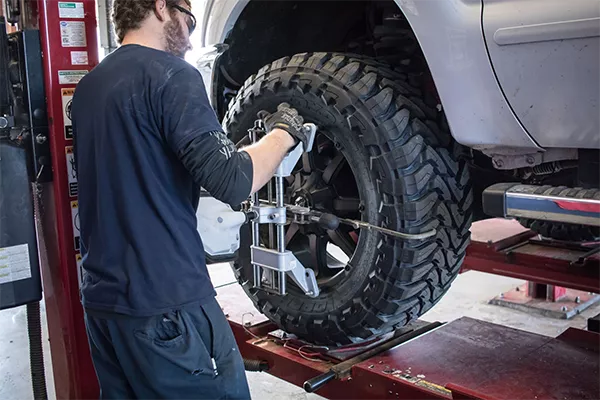
Unbalanced wheels are also a reason why a car vibrates
4. Damaged or bent wheels
Aside from an unbalanced wheel, damaged or bent wheels can also be the reason for car vibrations. A bent or damaged wheel is common for most cars especially if they often drive on potholes and sloppy road repairs.
These roads are hazardous to your wheels. Remember that even a small bump can already throw the car’s wheels out of round.
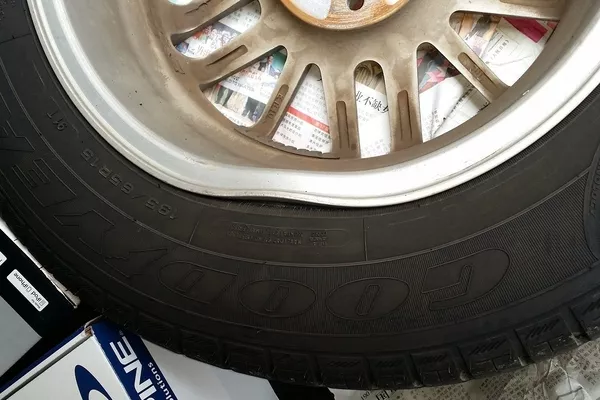
Damaged or bent wheels can also be the reason for car vibrations
You should also look out for a "runout". It is a term used to describe the amount of wheel deviation from the perfect circular rotation when it spun. A precision instrument is used by the wheel technicians to determine if the run out on any wheel exceeds half an inch. More often, but not all the time, the solution will be a new wheel.
Aside from tires, wheels are also a common culprit for a shaking and vibrating car. But not all the time.
>>> Also check: 5 Symptoms of Bad Wheel Bearings.
5. Power steering problems
If you notice that your car is vibrating only when you’re turning, then most probably, the culprit is the power steering system. To address this problem, inspect the hose of the power steering system in check if there are visible leaks. Also, inspect the reservoir and check if the power steering fluid is in need of a top off.
You can still check the steering system while the car is parked or not moving. If the matter is indeed coming from a bad power steering system, you will also feel the same shake and vibration when you turn the steering wheel even if it is parked.

If you notice that your car is vibrating only when you’re turning, the culprit is the power steering system
6. Axle problems
Cars are built up by various rotating and reciprocating parts that need to fall with a particular tolerance or measurements to properly perform. Even a minor fender bender can lead to a damaged car axle.
If the axle is bent, which commonly happens during a mishap or collision, it will make the ride shaky afterward. More often, the vibrating also intensifies if you drive faster.
In relation to that, another problem may also be a driveshaft that requires inspection. This car part rapidly spins which transfers power to rear wheels and axles in rear-wheel car drive. It also causes the cars to shake if it is bent.
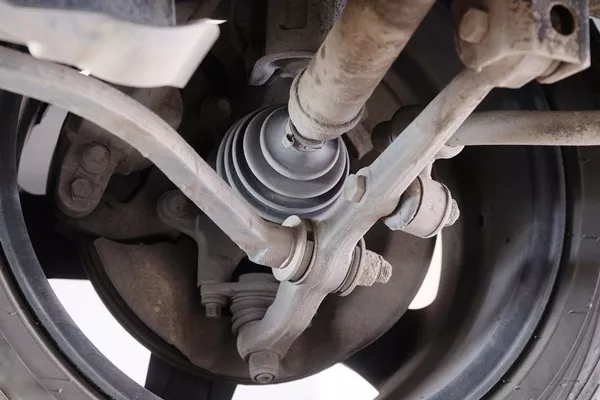
If the axle is bent, it will make the ride shaky afterward
A worn-out CV or constant velocity joints also the reason. When the rubber that looks like the accordion coverings around the drive axles’ ends, or also called “boots” are intact and the clams are also secured with no lubricants leaking out, then it is not the issue.
However, if these items are torn, meaning there are lots of dust, dirt, road filth that get in, thus causing harms to the joints. To cars with front-wheel drive, toasted or worn-out CV joints will mean you will need to buy novel drive axles as well.
Always remember that the given reasons might not be the only possible reason. When you're still in doubt, the best thing to do is to seek the assistance of automotive service personnel. Doing so will allow you to diagnose the problem accurately and will be addressed accordingly.
Recent posts
- How to flush and bleed power steering systems like an expert Mar 09, 2021
- Driving on a flat tire: Signs, warnings & tricks for Pinoy drivers Aug 16, 2022
- 8 common car problems during summer and how to avoid them Feb 15, 2019
- 6 common symtoms of a car's suspension system problems Oct 22, 2020
- 3 tire rotation patterns recommended for Pinoy car owners Apr 11, 2018












